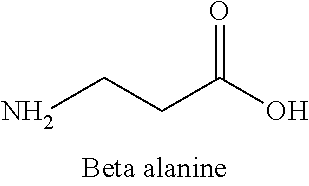Do you ever wonder why when you take your Pre Workout drink within 15 minutes or less you begin feeling a tingling in your skin? That feeling is called Mild Paresthesia. It is a common yet safe side effect of a commonly used product Beta Alanine.
Beta-Alanine is a non-essential amino acid and is the only naturally occurring beta-amino acid.
Foods such as chicken, beef, pork and fish contain high concentrations of it which through ingesting the dipeptide carnosine that we ingest most of our beta-alanine.
Carnosine acts as a buffer in muscle which helps reduce the amount of lactic acid, and free radicals. This buffer allows for longer, harder contractions especially in type 2 muscle fibers which are primarily used in high intensity strength training which promotes skeletal muscle growth.
Performance benefits typically occur in as little as one to two weeks, as carnosine levels increase, so will the benefits. The most dramatic results are usually realized within the 3-4 week range, however don’t end there. Recent research is now showing carnosine levels continue to increase for a minimum of 12 weeks which is why most people stay on Beta-Alanine for at least three months to optimize your carnosine levels.
Carnosine also Is powerful precursor in generating nitric oxide synthase (a group of enzymes necessary for making the powerful vasodilator nitric oxide.
Benefits of Beta-Alanine include:
- Delayed Muscular Fatigue
- Increases Aerobic Endurance
- Increase Anaerobic Endurance
- Increase Muscular Mass and Strength
Who can benefit from beta-alanine?
Men and women including but not limited too such as Weight lifters, bodybuilders, MMA, sports that require high endurance levels like soccer, hockey, runners, basketball
How much Beta-Alanine is needed to cause performance increases?
Typically, studies have used supplementing strategies of multiple doses of 400 mg or 800 mg, administered at regular intervals for up to eight hours, over periods ranging from 4 to 10 week*
After a 10-week supplementing strategy, the reported increase in intramuscular carnosine content was an average of 80.1% (range 18 to 205%)*
*Hill CA, Harris RC, Kim HJ, Harris BD, Sale C, Boobis LH, Kim CK, Wise JA. (2007). “Influence of beta-alanine supplementation on skeletal muscle carnosine concentrations and high intensity cycling capacity”. Amino Acids 32 (2): 225–33. doi:10.1007/s00726-006-0364-4. PMID 16868650.

